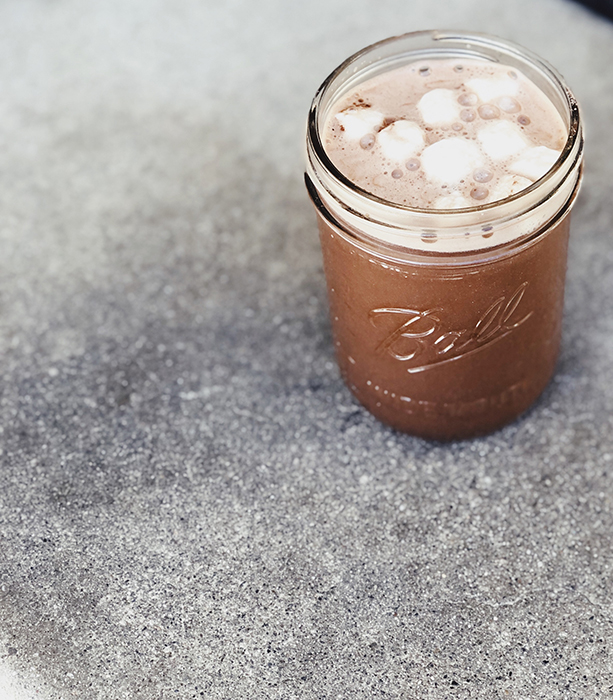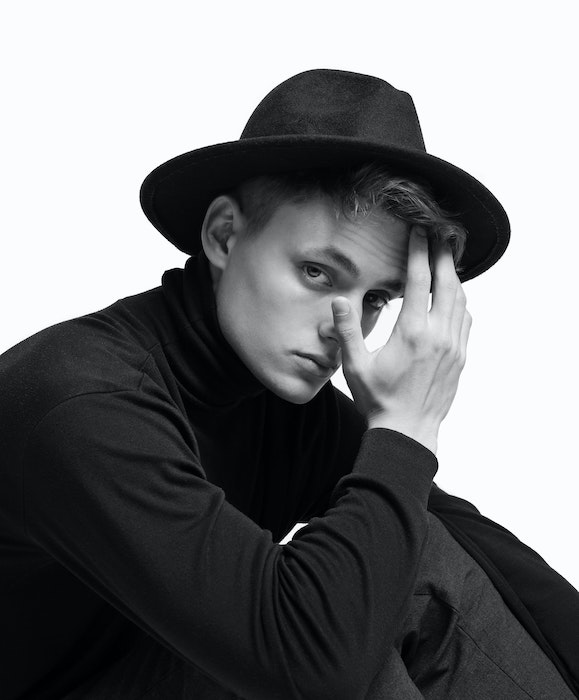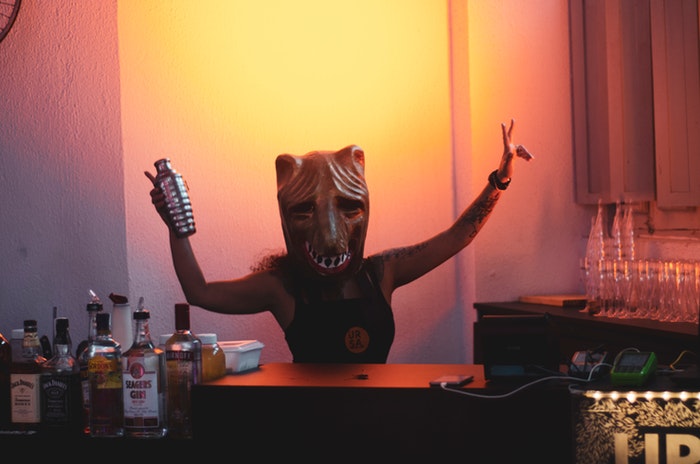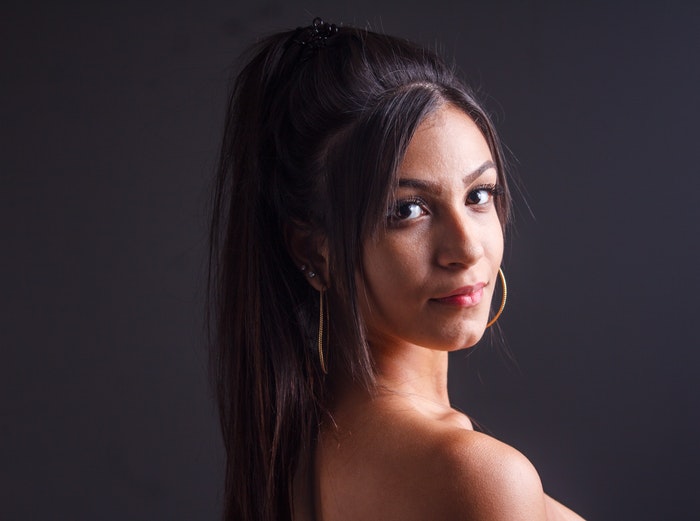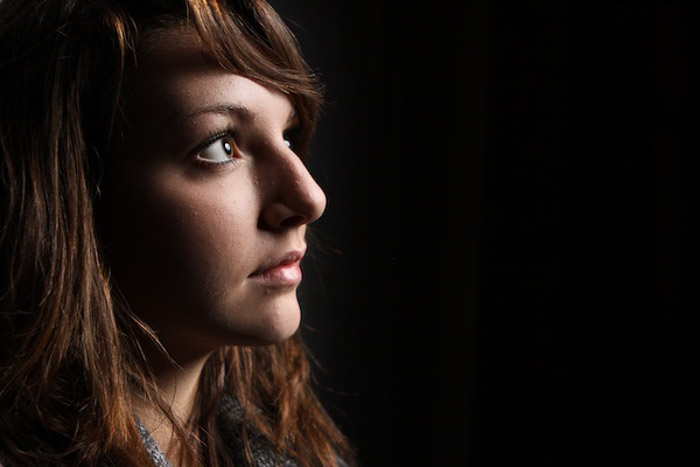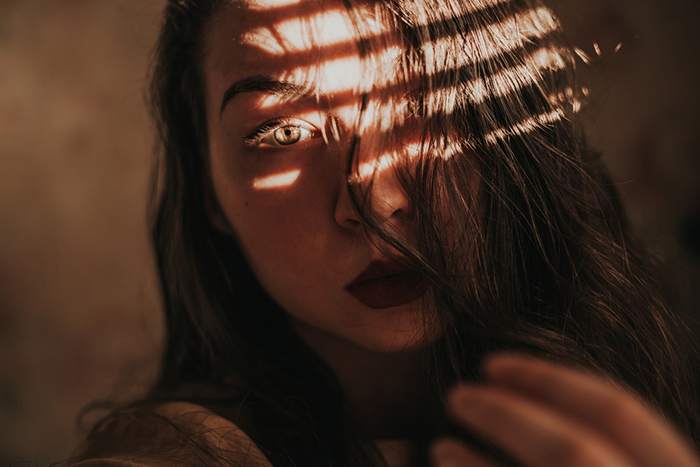Snow portraits are difficult to take because of harsh weather conditions and other factors. These are usually things you don’t even think about in the warmer months.
To make your winter portrait photography shoot a success, you should be aware of a few technical and creative tips.
Once you’re prepared, you’ll be able to take magical photos even when the weather isn’t ideal.
Protect Your Gear During Winter Portrait Photography at All Costs!
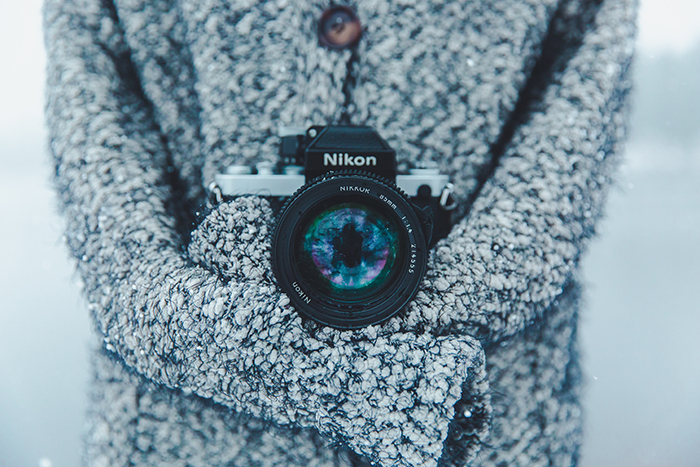
I don’t recommend taking photos when it’s freezing outside. Extreme cold weather can damage your equipment and harm your body.
Without a functioning camera or warm fingers, you won’t be able to focus on the creativity of your shoot.
To avoid this, you can use the following things:
- Special winter gloves for photographers
- A cleaning cloth for your lens
- A plastic bag or towel for your camera and tripod.
Also, make sure you have a large camera bag. You can keep your batteries, memory cards, and other tools warm inside it.
Most batteries lose power when they’re exposed to cold temperatures. Make sure you bring a lot of spare ones with you.
Stay Cozy to Avoid Discomfort
This is one of the most important things you can do in the winter. Wear an outfit that gives you enough room to use your arms. The more comfortable you feel, the easier it will be to give instructions to your model.
Don’t forget to bring snacks and a thermos to your shoot. This will make your model feel at home and give you a good reason to take more breaks.
Make Sure There’s Shelter Nearby to Avoid Danger
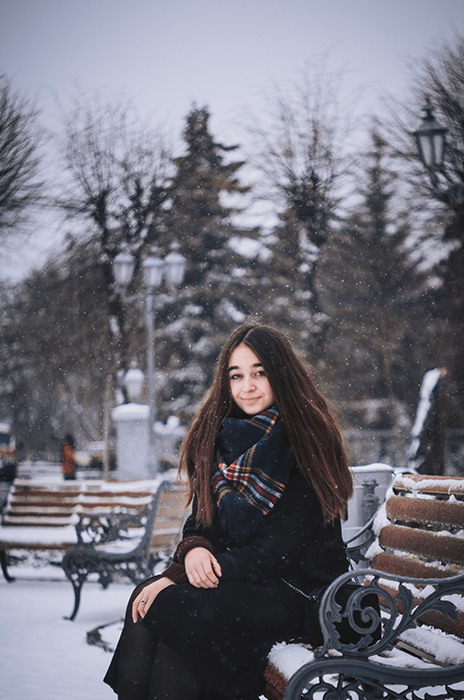
There are lots of photo opportunities in public places. Don’t overlook a location just because it’s popular.
Safety is key during a winter portrait shoot. A location with a lot of snow might be filled with dangerous pits. Make sure you take photos in risk-free places. These can be parks, gardens, and ice rinks.
If you plan to take photos in a remote location, go out when the weather conditions are favourable. The bigger your team, the safer you and your model will feel in unfamiliar places.
Use a Large Aperture to Blur Your Backgrounds
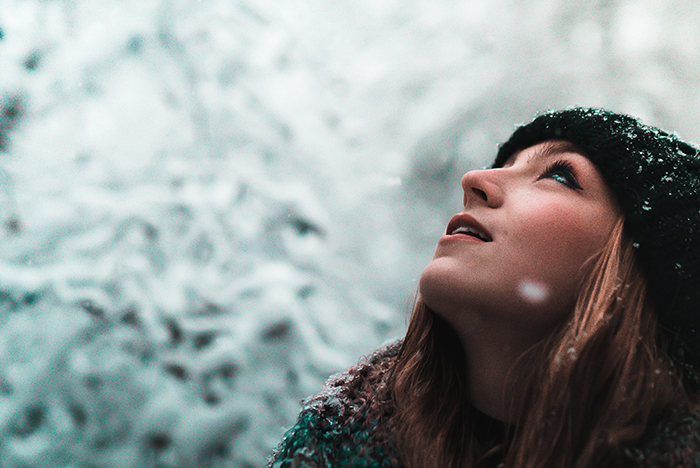
A large aperture will separate your model from their surroundings. The softer the background, the more magical your portraits will look.
Examples of large apertures are f/1.2 and f/2.0. The smaller the number, the narrower your depth of field. And the dreamier your photos will look.
If you find it difficult to use manual focus because of all the blur, don’t hesitate to switch to autofocus.
Use Burst Mode to Make Your Portraits More Exciting
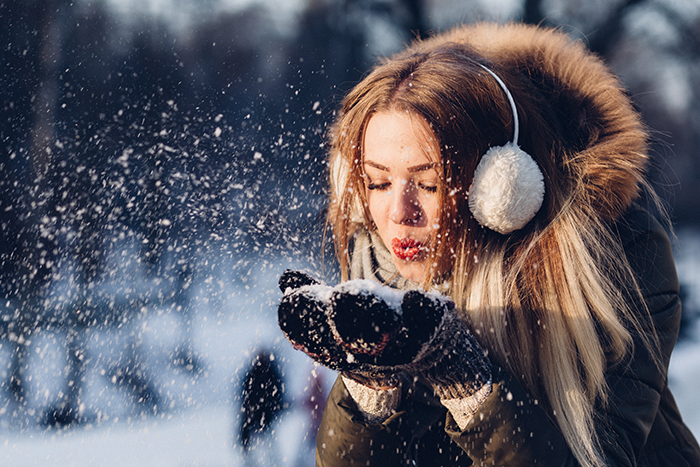
Make sure the background is dark to emphasise the snow.
Some of the most magical snow portraits feature falling snow. It can get difficult to use your camera when it’s snowing, though.
You can re-create falling snow by having your model blow it out of their hands. (The fluffier the snow, the easier it will be to blow it out.) To capture all the details, shoot in burst mode.
In this case, having a large aperture might not work to your advantage. Use a large f-number, such as f/3.5, to make sure that both your subject and the snow are in focus.
Pay Attention to Your Exposure to Avoid Overexposing Your Photos
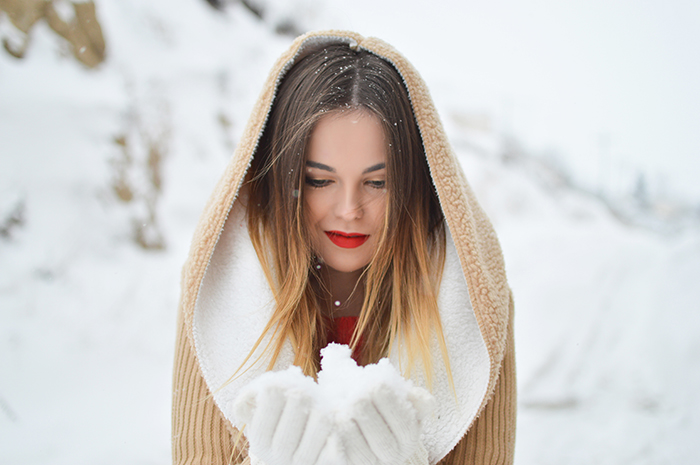
If your results end up a little underexposed, you can fix them in your editing program.
Bright snow will make your model’s face stand out and create flattering, atmospheric lighting. If you don’t use the right exposure, it will blow out your highlights and look unflattering.
To avoid overexposing your photos, take a few test photos at the beginning of your shoot. Don’t use Auto mode.
To preserve as much image data as possible, shoot in RAW mode. This will ensure that you’ll be able to fix photography lighting mistakes without ruining your photo’s quality.
Stay Away from Distracting Backgrounds
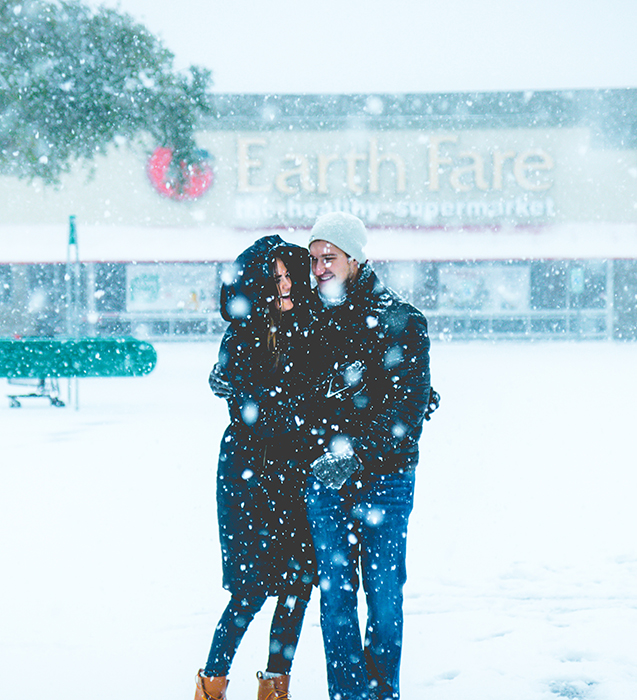
Having to focus on falling snow, staying warm, and giving your model instructions can make it difficult to pay attention to compositions and backgrounds.
For the best results, make sure your model isn’t surrounded by distracting objects like branches or signs.
Stay away from stores and busy streets. These will ruin your compositions.
Make Sure You and Your Model Are on the Same Page Before Your Shoot
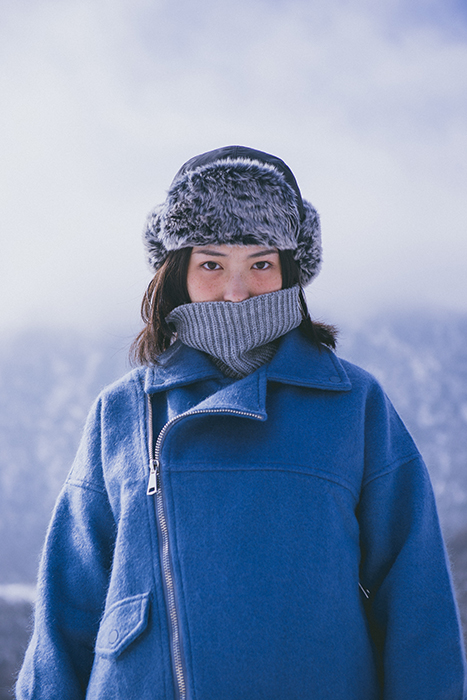
Winter photoshoots are a little more challenging than other portrait shoots. You need to be extra prepared before you go out. This includes brainstorming with your model.
Before your shoot, make a list of concepts and ideas that you’d like to re-create. Ask your model for feedback.
If possible, provide them with a mood board so they have a better idea of your vision.
If you and your model are on the same page, you’ll be able to collaborate without feeling awkward or confused.
Have Your Subjects Wear Better Outfits Underneath Their Jackets
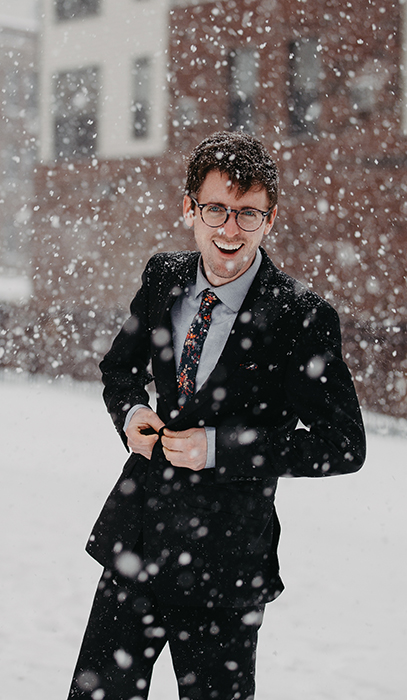
Make sure your model puts something warm on after you take photos of them.
Puffy jackets might look unflattering in some portraits. Your model can wear something less appropriate for the weather. This can be a suit. Just make sure they don’t stand out in the cold for too long.
If the weather is mild, this can be a great way to take unusual winter portraits without getting sick!
Use a Variety of Props Throughout Your Shoot
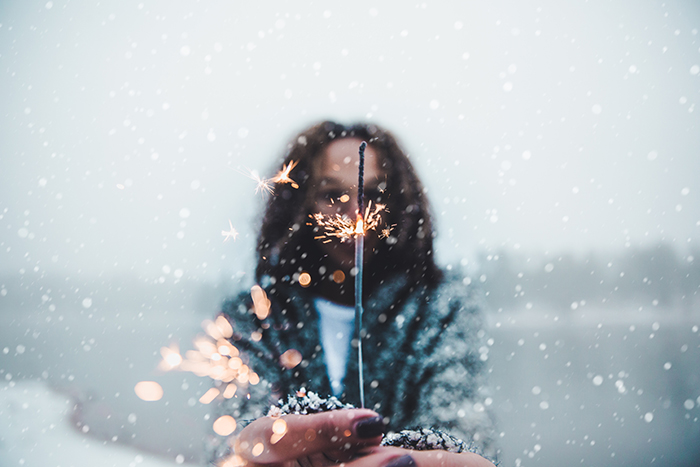
To avoid taking dull winter portraits, include bright, colorful subjects in your photos.
The best snow portraits feature more than just winter outfits and flattering poses.
To make your photos stand out, use vibrant props like sparklers and fairy lights. These will add a boost of color to the winter atmosphere. And they’ll make your model’s face stand out even more.
Some props can only be used when it’s not snowing. If you want to add more texture to the photos you take on those days, you can create fake snow in your editing program.
Take Photos When It’s Sunny for Extra Special Portraits
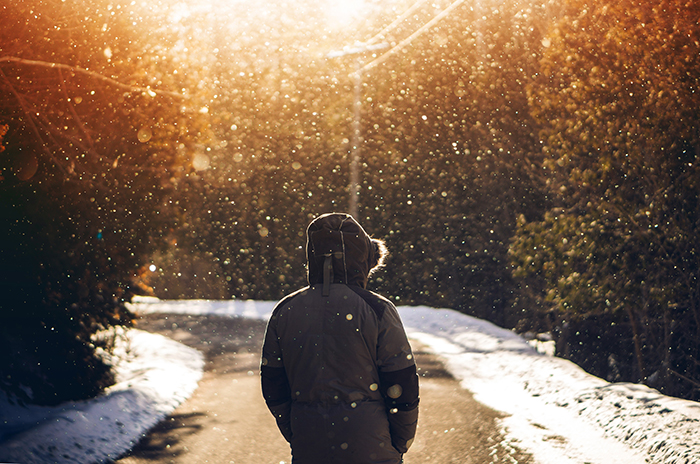
When it’s sunny and snowy at the same time, take as many photos as possible! The sunlight will illuminate the falling snow and create gorgeous bokeh.
Winter is known for being moody and dull. Photos taken on a gloomy day won’t always help you achieve the magical look you’re going for.
If possible, take photos when it’s sunny outside. Even a hint of sunlight will make your photos glow.
Shoot in the Dark to Create Moody Portraits
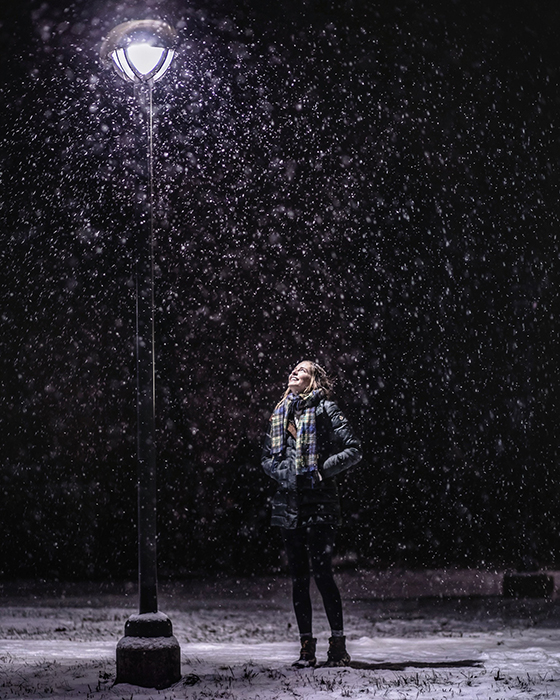
An alternative to warm and glowing portraits is artificial light. One of the best ways to emphasise falling snow is to light it using a bright light source. Photograph it in front of a dark background.
You can take photos like the one above in any park with street lamps. You can also use a torch to make the snow stand out.
Take Action Shots to Improve Your Sports Photography Skills
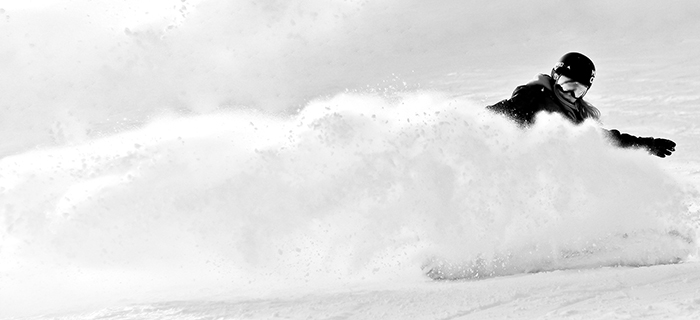
Sports photography can help you take outstanding photos of your model.
All the action will create impressive textures. And it’ll challenge you to make the most of your camera within a short period of time.
Or Take Simple Photos of Your Sporty Subject
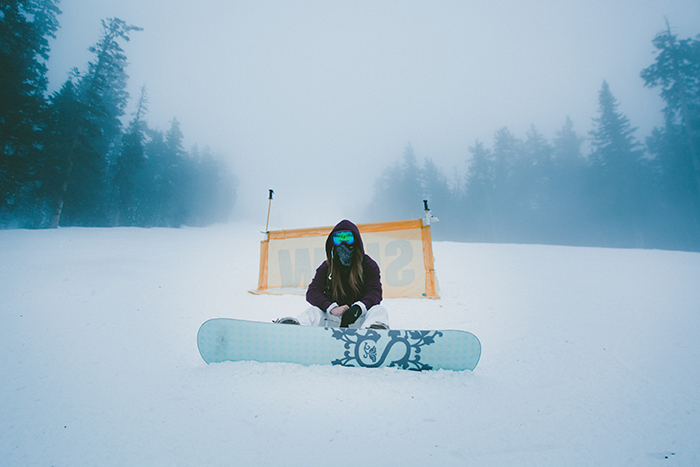
You can take a break from an action-packed photoshoot to take atmospheric sports photos.
Before or after your photoshoot, take casual photos of your model in their sports outfit. You can use this to focus on your location or on your model’s equipment.
You can use the photos you take during this time in diptychs, triptychs, or other cool photo collages.
Shoot in Picturesque Locations to Make Your Portraits Stand Out
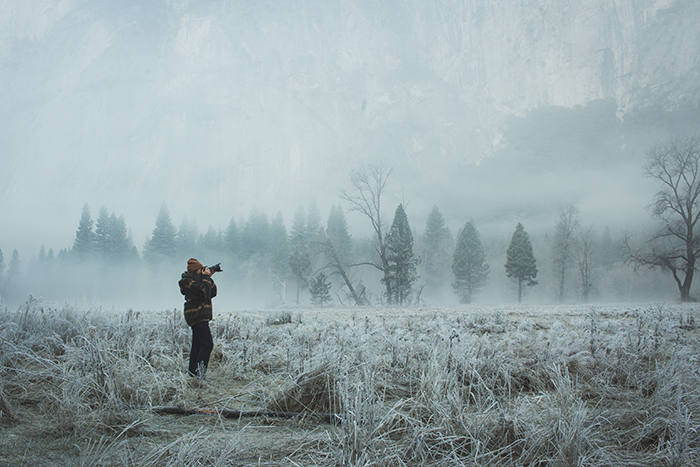
Forests, mountains, and lakes all look otherworldly in the winter.
Though winter landscapes aren’t vibrant, they can serve as stunning backgrounds for your portraits.
Visit picturesque locations in your area during a foggy day. You’ll create surreal and dreamy photos.
For more atmospheric photos, use a small aperture (such as f/5.0). This will help you capture as much of your model and their environment as possible.
If you use a larger aperture (like f/1.2), you won’t be able to capture as much detail, but your model will stand out.
There’s no right or wrong when it comes to aperture. If you’re a beginner, don’t be afraid of experimenting with different apertures. See which ones fit your style the most.
Use Falling Snow as a Foreground for Dreamy Photos
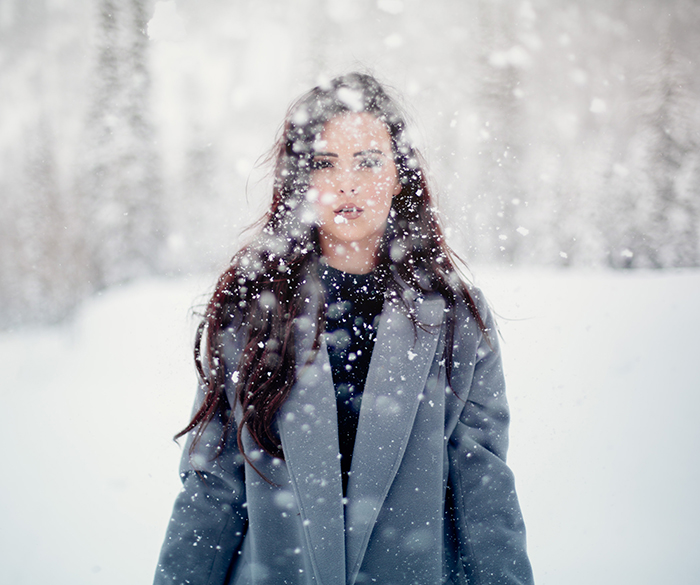
Falling snow (especially the fluffy kind) is the epitome of magic.
The closer the snow falls to your lens, the blurrier it will appear. This blur, also known as the foreground, can frame a photo. It’ll make simple portraits look more interesting.
Don’t worry if your foreground covers parts of your model’s body or face. This might result in unusual, abstract photos like the one above.
Take Breaks to Prevent Coldness and Boredom
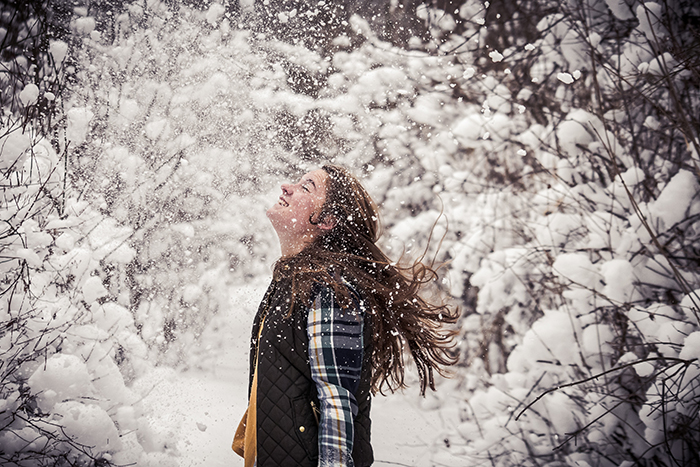
Even though winter portrait photography is a serious business, it shouldn’t stop you from having fun.
Make sure you take breaks, stretch your arms to avoid feeling tense. Talk to your model about your ideas. Being open and relaxed will make everyone in your team feel comfortable. This will lead to better photos.
And the better your experience, the likelier it will be that your model will want to work with you again.
Conclusion
The cold winter months are challenging. But they don’t have to stop you from taking stunning photos of people.
Use this time as an opportunity to deepen your knowledge of camera settings and compositions.
As long as everyone involved is warm and safe, you’re guaranteed to have a fun time. And you’ll add a collection of outstanding snow portraits to your photography portfolio or gallery.
